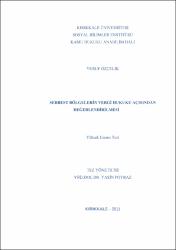| dc.contributor.advisor | Poyraz, Yasin | |
| dc.contributor.author | Özçelik, Yusuf | |
| dc.date.accessioned | 2021-01-16T18:58:44Z | |
| dc.date.available | 2021-01-16T18:58:44Z | |
| dc.date.issued | 2011 | |
| dc.identifier.uri | | |
| dc.identifier.uri | https://hdl.handle.net/20.500.12587/15196 | |
| dc.description | YÖK Tez ID: 308647 | en_US |
| dc.description.abstract | Serbest bölgeler, bir devletin siyasi sınırları içerisinde bulunmakla beraber, gümrük sınırları dışında sayılan, ülkede geçerli olan dış ticaret ile diğer mali ve iktisadi alanlara ilişkin devlet düzenlemelerinin ortadan tamamen kaldırıldığı veya kısmen uygulandığı özel alanlardır. Bu alanlarda üretim, ihracat ve yabancı sermaye yatırımlarının artırılması amacıyla ülkenin diğer kesimlerine kıyasla bazı sınai ve ticari faaliyetler için daha geniş teşvikler ve muafiyetler uygulanmaktadır. Türkiye'de de özellikle 1980'lerde başlayan ihracata yönelik sanayileşme stratejisi ve dışa yönelik ekonomi modeli çerçevesinde ortaya çıkan serbest bölgelerde, yatırımcılara sınırsız vergi muafiyeti tanınmaktaydı. Ancak serbest bölgelerde zamanla üretim ve ihracat amaçlarından uzaklaşarak ticari faaliyetlere ağırlık verilmesi üzerine vergisel teşvikler tartışma konusu haline gelmiş ve 5084 sayılı Kanun ile vergileme rejiminde değişiklikler yapılmıştır. Bu çalışmanın hazırlanma gayesi günümüzde hızla gelişen ve yaygınlaşan serbest bölgeler ve bu bölgelere sağlanan teşviklerin dayanaklarının ve uygulamalarının vergi hukuku açısından analiz edilmesidir.Çalışma üç bölümden oluşmaktadır. Birinci Bölümde, genel olarak serbest bölge kavramı üzerinde durularak, tanımı, amacı, türleri, genel özellikleri ve ülke ekonomisine olan olumlu ve olumsuz etkileri incelenmiştir. Ardından, Türkiye'deki serbest bölgeler ele alınmış, tarihsel gelişimi, yasal, idari altyapısı hakkında bilgi verilerek Türkiye'deki serbest bölgeler ele alınmıştır.İkinci Bölümde, 5084 sayılı kanun öncesi ve sonrasında serbest bölgelerdeki vergisel durum, gelir vergisi, kurumlar vergisi, katma değer vergisi ve diğer vergiler açısından ele alınmış ve değişiklikler konusunda değerlendirmeler yapılmıştır.Üçüncü Bölümde, vergilendirmede eşitlik ilkesi çerçevesinde Serbest Bölgeler Kanunu'nun değerlenirmesini yapmaya çalışacağız. Bu kapsamda, vergileme ilkelerinin neler olduğunu, 1982 Anayasası'nda vergileme ilkeleri ve vergilemede eşitlik ilkesinin yerini, Anayasa Mahkemesi kararlarında vergilemede eşitlik ilkesinin ne anlama geldiğini açıklamaya çalışacağız. Son olarak da 3218 sayılı Kanun'da yapılan değişikliklerin vergilemede eşitlik ilkesi açısından değerlendirmesini yapacağız. | en_US |
| dc.description.abstract | Free zones are private areas located within the borders of a country but considered as outside the customs' border of country and where effective foreign trade and other financial and economical state regulations are completely abolished or partly applied. When considered with the other sections of the country wider incentives and exemptions are applied for some industrial and commercial activities in order to increase production, export and foreign capital investments in these areas. Tax-related incentives are the most important ones among those exemptions. Also in Turkey, unlimited tax exemptions were given to the investors in free zones emerged in the frame of economical model directed towards abroad and industrialization strategy directed towards export which started in 80's. However tax-related incentives fell into a controversial situation after production and export fell wide of the mark in the course of time and commercial activities had become widespread and changes had been made on taxation system with the Law no 5084. Purpose of this paper is rapidly developing free zones and analyzing supports of incentives provided to these zones from the point of tax law.This study is formed of three sections. In the first section free zone concept is taken into consideration generally and its definition, purpose, types, general characteristics and positive and negative effects on country's economy are examined. Then free zones in Turkey are considered, the free zones in Turkey are considered by providing information on historical development, legal, administrative infrastructures.In the second section tax-relation situation in free zones are evaluated before and after the Law no 5084 from the point of income tax, corporate tax, value added tax and other taxes view and evaluations are made about the changes.In the third section, we will try to evaluate Free Zones Law in the frame of equality principles in taxation. In this scope we will try to explain what are the taxation principles, taxation principles in 1982 Constitution and position of equality principle in taxation. Finally, we will make evaluation of amendments in the Law no 3218 in terms of equality principle in taxation. | en_US |
| dc.language.iso | tur | en_US |
| dc.publisher | Kırıkkale Üniversitesi | en_US |
| dc.rights | info:eu-repo/semantics/openAccess | en_US |
| dc.subject | Hukuk | en_US |
| dc.subject | Law | en_US |
| dc.subject | | en_US |
| dc.subject | | en_US |
| dc.subject | | en_US |
| dc.subject | | en_US |
| dc.title | Serbest bölgelerin Vergi Hukuku açısından değerlendirilmesi | en_US |
| dc.title.alternative | Evaluation of the free trade zones in terms of Tax Law | en_US |
| dc.type | masterThesis | en_US |
| dc.contributor.department | KKÜ, Sosyal Bilimler Enstitüsü, Kamu Hukuku Anabilim Dalı | en_US |
| dc.identifier.startpage | 1 | en_US |
| dc.identifier.endpage | 130 | en_US |
| dc.relation.publicationcategory | Tez | en_US |
















